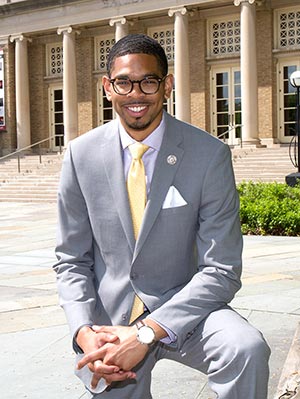Saldana turns setbacks into success, helps others rise
By John Carberry

Six years ago, when a contented Ignacio “Iggy” Saldana cruised out of Adlai Stevenson High School in The Bronx and slid into a comfortable routine of slow mornings watching cartoons and afternoon basketball, he never saw this coming.
“I really don’t know how I got this far,” said Saldana, just days before earning a bachelor’s degree in development sociology from Cornell and heading toward first-year law study at Columbia University. “Fortunately, with a lot of help from a lot of people, I made it.”
Years earlier, Saldana, his mother and six siblings lost the public assistance they needed to survive. No aid with rent, groceries or childcare costs.
“I think that was the moment when I really had to mature,” Saldana said. “I realized I was the oldest man in the house, and my mother couldn’t do it by herself.”
He took a job at a nearby McDonald’s, working extra hours, dreaming of a collegiate basketball career to save his family. One night after working late, he struck up a conversation with the franchise owner.
“So I asked him, ‘How do I do that?’” Saldana remembered. “He told me, ‘You’re never going to be able to do this without an education.’”
So he mixed his old fantasy with a new ambition to become a big time scholar-athlete. With no SAT scores and a high school transcript painted with C’s, Saldana needed to find a door into the SUNY system. That door was Tompkins Cortland Community College (TC3).
Life as a community college student in Dryden, New York, was “a culture shock.” Saldana said he was shocked by the number of international students at the college, and by living and studying with so many white people.
“Aside from taking an order, I had never interacted with someone who wasn’t black or Hispanic,” he said.
The biggest shock, however, was his own rising determination to dig into his coursework. Faculty and staff mentors at TC3 introduced him to politics, student government, peer mentoring and a previously unimagined notion: he could go to Cornell.
He chose his courses based on what might make him the strongest transfer candidate. He became student government president. He stayed for a fifth semester at TC3 to improve his academic profile.
“There was no way I was not going here,” Saldana said. “And fortunately, with a lot of help from a lot of people, I got in.”
At Cornell, he found his dream major in the Department of Development Sociology, a discipline he called a combination of everything he was interested in – politics, economics, people and community outreach. At the end of his first semester as an Ivy Leaguer, Saldana delivered a lineup of straight A’s.
Now convinced he belonged, he needed to do more. He knew struggle, he knew self-doubt and he knew culture shock, and he knew he had to finds ways to help people facing those challenges.
Saldana reached out and was welcomed by Alpha Phi Alpha, the nation’s first African-American intercollegiate Greek organization. He credits his Alpha brothers with teaching him the mindset of the successful student and with introducing him to programs designed to help underrepresented minority students.
During his two years at Cornell, Saldana grew into new scholarly and service roles. He became the political action chair for Black Students United. He invested his time and talents to Practice Makes Perfect, a nonprofit organization founded by Karim Abouelnaga ‘13 that brings summer learning programs to socioeconomically disadvantaged neighborhoods.
Most recently, Saldana joined a group of peers exploring ways to improve the experience of diverse College of Agriculture and Life Sciences (CALS) students. The panel presented to CALS leadership during the recent Advisory Council meeting.
“Iggy reminds us of the best of who we are and what we all hope to do,” said CALS Dean Kathryn J. Boor. “His fight to get here is a testament to ‘any person, any study,’ and his determination to return to help his family and others is a living example of the very heart of the land-grant mission.”
Through it all, for Saldana, the motivation is simple.
“There’s no life I’m going to live where I’m not going back to help, to make the world less arduous for the next group of kids coming up,” Saldana said. “Breaks are given to far too few in this world. If I can do it justice by giving someone else that opportunity, I have to.”
John Carberry is managing editor of the College of Agriculture and Life Sciences.
Media Contact
Get Cornell news delivered right to your inbox.
Subscribe